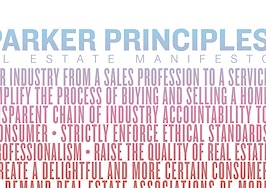At Inman Disconnect, a group of industry leaders got together and addressed a number of leading real estate issues. They came up with a manifesto called the Parker Principles, which is a compilation of 12 principles. Interestingly enough, 11 of the principles centered on the consumer, which is a credit to those involved.
However, the ones that really caught my attention were Principles 3 and 7. Principle 3 proposes that we “Create a transparent chain of industry accountability to benefit the consumer.” Principle 7 advocates removing “artificial and overly protective barriers to property data access”
Principle 3 goes on to state “From associations/MLSs to brokers, brokers to agents, and brokers and agents to consumers, we must hold the industry to a higher standard of service, transparency and responsibility. The core of accountability is transparency across the industry.”
Accountability and transparency of some MLSs
My interest in these principles is how they might apply to some MLSs. In particular, I’m focusing on those MLSs that refuse to share data with their neighboring MLSs.
It is no secret that the intent of not sharing data is often an attempt to limit non-member “outsiders” from selling “their” real estate.
However, to the consumer, the MLS is that magical place where their home is made available to tens of thousands of other Realtors, with ready, willing and able buyers.
But what if that wasn’t really true?
The MLS is the primary reason that agents get listings. It is one of the biggest advantages that they can offer potential sellers. But what if their MLS isn’t really offering the consumer that much of an advantage? Do they tell them that?
Upon meeting with a seller, agents inform them that their home will be “in the MLS.” What would the consumer’s reaction be if they really knew that “the MLS” may be nothing more than a few hundred other agents?
It may be a stretch, but some may even argue that not informing the consumer of this very limited exposure is a violation of the Realtor Code of Ethics, Standard of Practice 1-12, which states, “When entering into listing contracts, Realtors must advise sellers/landlords of the Realtor’s company policies regarding cooperation.”
When the MLSs refuse to share data, are they attempting to restrain trade?
What some in the industry feel is an attempt to restrain trade may very well be addressed when the Federal Trade Commission and the Department of Justice meet on June 5 to examine competition in real estate.
I know that some agents and brokers have attempted to put a spotlight on this issue by filing complaints against non-data sharing MLSs. The FTC has provided an easy way to file a complaint about this issue. Zillow may also liven up that DOJ and FTC meeting, based upon a recent workshop.
We can’t offer a higher standard of accountability if we mislead consumers
When meeting with consumers, in my opinion, we need to be honest. If that means telling them that their home will only be put into a small MLS that refuses to data share with their neighboring MLSs, then so be it.
If your MLS only has a few hundred, or even 1,500 members, yet the neighboring one has 15,000 to 35,000 members, consumers need to know that their home won’t be available to those neighboring agents.
Consumers also need to know that although their property may be on sites like Zillow and Trulia, without the agreement to cooperate with those other 15,000 to 35,000 agents in the MLS next door, they may lose out on many potential buyers.
Let’s break down our MLS walls
Teresa Boardman, an Inman columnist and broker/owner of Boardman Realty in St. Paul, Minnesota, recently wrote an article about putting or not putting listings on Zillow. In the article she points out that “The days of agents being gatekeepers and having secret information are gone.”
Teresa then laments that “The gatekeeper mentality is alive and well in the real estate industry.”
This certainly applies to those MLSs that build walls around themselves. They hurt the consumer, their own members and the real estate industry. The good news is that we, their members, can advocate for our clients and the real estate profession.
These non-data sharing MLSs exist because we financially support them. As their customer, we can demand that they change things like refusing to share data with neighboring MLSs and other sites.
All too often, rather than rock the boat and demand change, we simply join the larger MLS, along with our local one. This means we have to enter the same listing into an MLS twice, plus pay for two or more MLSs. Wouldn’t it be simpler, and less expensive, to just share data with our neighboring MLSs?
Walls come down brick by brick, so do your profession and yourself a favor: Pick up that hammer, and start taking down the wall.
Jim Weix is the broker/owner for The Real Estate Company, Inc. in Florida. Connect with him on LinkedIn or follow him on Facebook.









